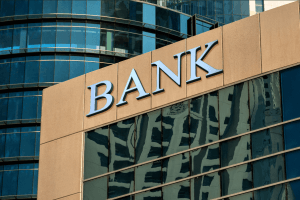With Banks Turning to Bitcoin, Is It Finally Time to Long the Bankers?
Bank adoption might bring the number of crypto users “from 100m+ to 1bn.” Growing bank involvement in crypto will also be a boost for the banks themselves. Some warn that a large bank-based custodial layer could create systemic risk for the BTC market.

Source: Adobe/Antonio
The banks are coming. After years of derision and suspicion, major banks are gradually warming to Bitcoin (BTC), with many major financial institutions beginning to roll out crypto-related services.
In the past, much of the Bitcoin community was taken to declaring, “Long bitcoin, short the bankers.” But now that the likes of Goldman Sachs, Morgan Stanley, BNY Mellon, State Street, Deutsche Bank and others are entering the crypto space, is it now to long banks as well as BTC?
According to industry players speaking with Cryptonews.com, involving themselves in crypto will be a large net positive for banks with few risks (assuming that they don’t hold crypto themselves). Likewise, while certain commentators suggest that a large bank-based custodial layer could create systemic risk for crypto, others claim that the involvement of banks will largely make crypto more secure and stable.
Banks jump on the bandwagon = the bandwagon speeds up
It seems that barely a fortnight is going by without some major bank or financial institution announcing that it’s dipping its toes in crypto in one way or another.
Back in February, America’s oldest bank BNY Mellon revealed that it was rolling out services for its wealth management clients, who could buy, hold and sell bitcoin through the bank. Likewise, Morgan Stanley announced in mid-March that it would let its weather clients invest in three bitcoin funds.
And at the end of March, it was reported that Goldman Sachs would welcome Q2 2021 by offering its wealth management clients a “full spectrum” of investments in bitcoin and other cryptoassets.
This is quite a turnaround for a bank whose investment strategy group effectively declared in 2018 that bitcoin was dead. And it goes to show just how far the mood among the banking sector has changed in only the past few months.
For many industry figures, this turnaround is a big, big positive for bitcoin and the wider crypto market.
“Banks adoption is obviously the key at this stage, it will bring the number of crypto users from 100m+ to 1bn+ likely,” said Igor Khmel, the CEO and founder of digital asset banking firm Bankex.
According to Campbell Adams, the founder of interbank marketplace Pure Digital Markets, bank involvement is arguably the biggest thing that could happen to bitcoin in terms of boosting wider adoption.
As reported this week, State Street’s trading platform Currenex partnered with London-based Puremarkets Ltd (Pure Digital) in order to develop a wholesale, multi-custodial digital currency trading platform.
“The fragmented and mainly retail driven crypto infrastructure is a serious impediment to its development and vital maturation. Digital currency trading needs big balance sheet participants to boost capital efficiency and permit significant investment from real money and pension funds for instance,” he told Cryptonews.com.
In particular, Adams suggested that the participation of major banks is all-but indispensable if bitcoin and crypto want to shed their respective images as manipulable markets where current price isn’t always reliable.
“Global bank involvement will raise the quality bar and promote the establishment of a meaningful and reliable primary market from which meaningful market price discovery will cascade onto the markets below — in a similar way the traditional currency markets infrastructure operates today; reliably, robustly and successfully even in periods of extreme stress,” he said.
A new source of revenues
While growing bank involvement might boost bitcoin and crypto, it will also be a boost for the banks themselves. Not only will they generate higher revenues by charging clients for brokering transactions and custody services, but they will also increasingly develop their own blockchain-based platforms that will provide greater efficiencies and bring in new business.
“The tech underneath is key and will not simply evaporate: its use cases are too compelling to ignore for global banks and more importantly their clients. The value of crypto is not its price, especially with regard to the banking industry,” said Adams.
As Igor Khmel pointed out, numerous banks are already beginning to make use of crypto and blockchain for various purposes.
“Some banks issued stablecoins to automate internal bank processes — such as JPMorgan Coin for cross-border payment settlements. 70% of global central banks are piloting central bank digital currency solutions,” he said.
Khmel also reminded of Singaporean DBS Bank, which announced the launch of DBS Digital Exchange in December, providing customers with access to asset tokenization and the secondary trading of digital assets. With such banks beginning to embed themselves quite heavily in the sector, they will be future-proofing themselves for a world in which crypto plays a significant role.
A two-edged sword
Crypto holders might suppose this increasing involvement is a good enough reason to resume longing (rather than shorting) the banks, but could the overlapping of banking and crypto create risks for both?
Prominent Deribit researcher Hasu seems to think so, having published an analysis in May 2020 in which he argues that a large bank-based custodial layer (in which investors buy BTC through banks) could create systemic risk for the bitcoin market. This is largely because buyers may be prevented from converting their deposits with banks into actual bitcoin (ie. prevented from withdrawing bitcoin), either by government intervention or because bank fees have risen too high.
However, crypto industry players involved in the traditional banking sector, say that this is more than a remote, theoretical risk.
“I don’t think there’s systematic risk of bitcoin [centralization] due to banks. The industry will become more mature, and there will be enough money for both centralized and trustless systems development,” said Igor Khmel.
Campbell Adams agreed, arguing that a bank-based custodian layer would reduce systemic risk.
“Bank grade and regulatory compliant infrastructure would ensure levels of stability and security well above those currently being used. Credit intermediation would importantly be implemented through such a set up enabling and further stabilizing the crypto market generally for all,” he said.
Also, Caitlin Long, the CEO and Founder of the digital asset-focused bank Avanti, warned that the fact that Pure Digital is building an over-the-counter offering with bilateral credit lines means that “big banks bring big leverage to BTC. But leverage & bitcoin don’t mix-won’t end well for the banks.”
Also, banks may create risk for themselves (and for the crypto market) if they begin investing in bitcoin and other coins.
“Another scenario is banks put crypto on their balance sheets, open crypto deposits and especially if they do crypto lending. These are volatile assets with different types of risk,” said Igor Khmel.
This scenario is a long way off, however, and should it become an increasingly tangible possibility, it’s likely that new regulations and guidelines would be imposed on banks (e.g. related to capital requirements).
For now, the cryptoverse seems to be mostly content that financial institutions are beginning to onboard new and wealthy clients onto the market.
____
Learn more:
– US Banks Offering Crypto Custody is ‘Insanely’ Bullish and Risky
– Bitcoin, Ethereum & Stablecoin Tribes Fight Over Benefits Of OCC News
– Colombia’s Banco de Bogotá Begins Crypto Pilot
– BIS and SWIFT Intensify Race With Crypto For Cross-Border Payments
– Davos Watch: ‘Underestimated’ Digital Revolution & Unsafe ‘Magic Money Tree’
– Russian Banks Given Power to Freeze or Block Crypto-linked Accounts
– Spanish Banking Giant Prepared For Bitcoin
– Several Swiss Banks Are ‘Ready to Go’ Upon Crypto Gateway Launch – SDX
– Crypto Can Disrupt Legacy Finance And Add Another Layer On It – Panel




